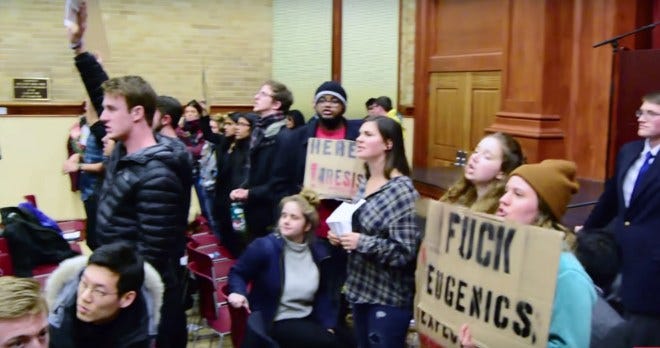Plato and Aristotle, Russell and Rawls, Darwin and Galton, Crick and Watson, Haldane and Hamilton. What do they have in common? Apart from being some of the most influential philosophers and biologists of the last few millennia, all of them openly supported some version of eugenics. In other words, all of them have argued that traits are to some degree heritable, and that this fact should influence how and with whom we choose to have children. In a passage that many philosophers quietly skip when they teach distributive justice, John Rawls writes:
“[Deliberators] want to insure for their descendants the best genetic endowment (assuming their own to be ?xed). The pursuit of reasonable policies in this regard is something that earlier generations owe to later ones... Thus over time a society is to take steps at least to preserve the general level of natural abilities and to prevent the diffusion of serious defects.” (1971, p. 107).
Should we stop teaching Rawls? What about Plato, who went much farther than Rawls and argued that the state should actively intervene to encourage eugenic reproductive norms? Of course, state policies will always indirectly affect our reproductive choices. Subsidies for contraception and prenatal tests affect who is born, and what characteristics they have. Prohibitions on incest and cousin marriage are partly meant to decrease the risk of congenital disorders, and often have an explicitly eugenic rationale. More generally, even policies like tax rates, education subsidies, and social welfare programs affect how many children people can afford to have, and at what point in their lives (if at all) they have children.
In thinking about future generations, reasonable people are likely to disagree about which traits they think are worth encouraging, and whether or not the state should have an active role in influencing our reproductive choices. I discuss some of these issues in the final chapter of my new book, Creating Future People.
My main conclusion: much of the current condemnation of eugenics is moral posturing, and many public denunciations are an attempt to avoid addressing legitimate arguments by deeming eugenics “offensive." The move seems to be that since some states have engaged in atrocities in the name of eugenics, anything an individual or state does that influences the genetic characteristics of future people must be wrong. This is a left wing version of a tactic some religious conservatives used a decade ago in equating state funding for stem cell research with state-sponsored murder.
But before smugly congratulating ourselves on rejecting every conceivable form of genetic enhancement (a euphemism for "eugenics"), we should ask whether we’d also reject environmental interventions aimed at improving the prospects of our children. Should pregnant women drink saki and eat sushi every night, given the risks posed by alcohol and mercury-rich seafood to their future children? Once their children are born, why not hand them over to the Ayatollahs in Iran for an education? All serious scholars know that both the environment and genes are relevant to the welfare of future people. But many pretend to be ignorant about the importance of genes.
When academics perfect the art of pearl-clutching rather than argumentation, they make our profession look ridiculous. “Eugenics,” which literally means “good birth,” is no more intrinsically evil than any other word or concept. It all depends on what form of eugenics we're talking about. In their influential book, From Chance to Choice, Allen Buchanan, Dan Brock, Norm Daniels, and Dan Wikler say what should be obvious to all:
"Eugenics is remembered mostly for the outrages committed in its name. Terrible as they were, however, these wrongs do not, in themselves, tell us about the validity of eugenic moral thinking…For the history of eugenics to be instructive in ensuring social justice in a society with greater knowledge about genes, and perhaps some ability to alter them, the key question is whether eugenics was wrong in its very inception. Our review finds that much of the bad reputation of eugenics is traceable to attributes that, at least in theory, might be avoidable in a future eugenic program" (2000, p. 43).
What has changed since these words were published? Have we suddenly learned that genes don’t do anything? Have we lost the ability to distinguish between subsidies for genetic testing and state-sponsored murder? Or has our profession become so politicized that some philosophers are now inclined to denounce freethinkers as heretics? I think we all know the answer. If we continue to create an environment in which scholars are more worried about what people in our profession are gossiping about than the integrity that comes with following an argument wherever it leads, we won’t deserve to inherit the tradition that began with Socrates drinking hemlock rather than selling his soul to sophists.




